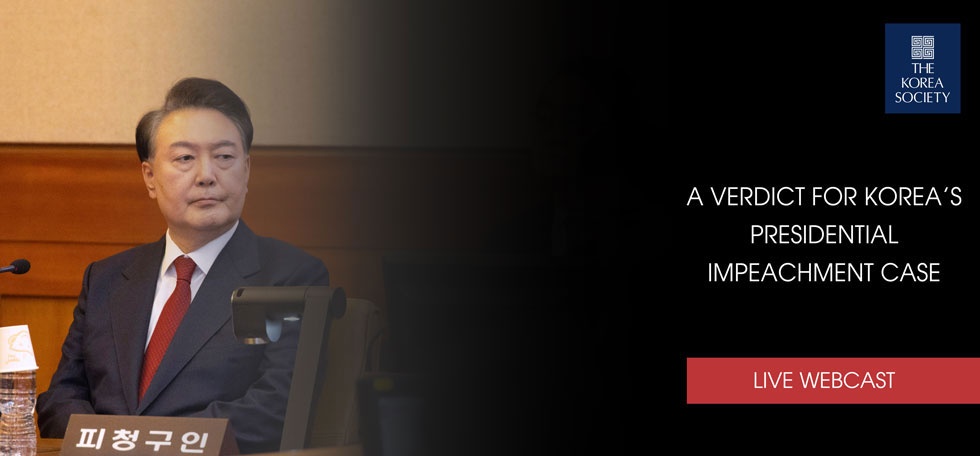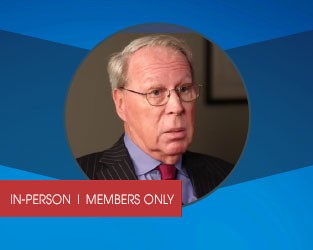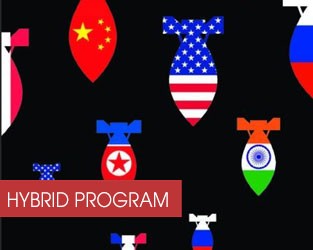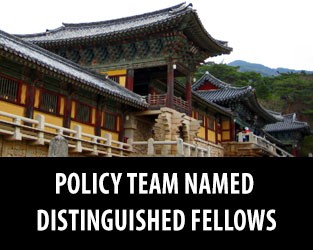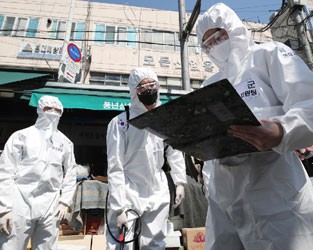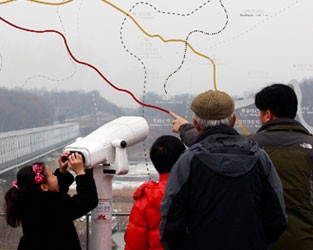![]()
Korbel School Dean, Ambassador Christopher Hill and The Korea Society President Ambassador Mark Minton, addressed Korea's rising regional and global influence. From the Seoul G20 and Nuclear Security Summit to the 2018 Winter Olympics, Korea has come of its own as regional host and hub. A harbinger of democracy, Korea supports international peacekeeping and leads in green growth. Korea is an Asian cultural leader--from film to KPop. From UN Secretary General Ban Ki-Moon to World Bank President Jim Yong Kim, Koreans and Korean Americans hold critical leadership roles as well. The Korea Society SVP Stephen Noerper introduced Ambassadors Hill and Minton, former distinguished diplomats and thought leaders on Korea. The two addressed Korea's enhanced relevancy internationally and what it means going forward, especially at a time of rising tensions on the Korean Peninsula.
PODCAST
Global Korea with Ambassadors Hill and Minton
Thursday, April 18, 2013
Ambassador Mark Minton, President of The Korea Society
Ambassador Christopher Hill, Dean of the Josef Korbel School of International Studies
Moderated by Dr. Stephen Noerper, Senior Vice President of The Korea Society
DR. NOERPER:
Good afternoon. I am Stephen Noerper, senior vice president of The Korea Society. We are delighted to be here today. I myself am a graduate of The Fletcher School and a professor of international relations but have been a long-term admirer of the Korbel School and its distinguished legacy which includes Condoleezza Rice, Madam Albright and others. We were privileged to have Dean Hill as a guest of The Korea Society earlier this year for a fascinating discussion between Ambassador Hill and Ambassador Minton ensued, and a podcast of that conversation has been downloaded several thousand times.
We thought we'd spend part of the time we have here today expanding on that discussion, as this is a very critical time for the Korean Peninsula. We've all been moved by the tremendous stories of the year, including the many challenges we face dealing with North Korea and the role the international community can play in crisis management for the region. In addition to addressing some of these issues, we'd also like to talk about Global Korea: the Korea we all know and its successful emergence as both a regional hub and a regional leader. South Korea has hosted both the G20 and the Nuclear Security Summit. The hallyu (represented by celebrities such as PSY and his songs "Gangnam Style" and "Gentleman") is contributing to Korea's cultural presence internationally with no end in sight.
Today we have the privilege of listening to another discussion between two United States thought leaders in the form of Ambassador Hill and Ambassador Minton. The dean of the Korbel School certainly needs no introduction but a statement of great note: a four-time ambassador, a former assistant secretary of state for East Asia and Pacific, a guiding force in the accomplishments of the 2005 agreement (and then some) to which we still make reference, including the most recent sit-down in Korea by Secretary Kerry.
Ambassador Minton is the president of The Korea Society. He was ambassador to Mongolia from 2006 to 2009 and has served three tours of duty in Korea. Ambassador Minton's roles included deputy chief of mission and chargé of the deputy ambassador. He served as director of the Korea desk and has spent a significant portion of his career on Japan. Today these two great regionalists will help guide us with a discussion on Korea, the meaning of global Korea, and their thoughts on managing some of the very serious situations we're dealing with today. Thank you. Ambassador Hill?
AMBASSADOR HILL:
Thank you very much Stephen. Mark, welcome to the Korbel School. It's great to have you here. Mark and I go way back and we've kept in touch over the years. The two of us worked together in the State Department's Policy Planning Staff under Director Paul Wolfowitz. This was in the early 1980s, long before anyone had heard the term "neoconservative" or considered invading Iraq. Mark is one of our foremost East Asia experts having served in Japan, Korea and, of course, Mongolia—a sort of go-go place these days with what I believe is an economy that hasn't seen growth south of 12 percent in recent years.
This is a great occasion to talk about Korea with you, Mark. When you mention Korea in the United States these days, it is assumed you are talking about North Korea. Of course, everyone here knows there is the Republic of Korea and then there's a prison camp called North Korea. The real dynamism and excitement on the Korean Peninsula these days is not being generated by the omnipresence of Kim Jong Un, but rather the global platform upon which the Republic of Korea now operates. I wonder if you could talk a little about how the present state of affairs on the Peninsula impacts what The Korea Society is doing today, and more generally, the current state of things in the Republic of Korea.
AMBASSADOR MINTON:
Thank you, Chris. I appreciate you inviting me here today to participate in a discussion with you. You're quite right when you speak about our going back a long way. I have followed the achievements of the Korbel School for years, and I'm delighted to be here today.
As Dr. Noerper suggested and you confirmed, every morning The Korea Society and the international community at large hears more North Korean rhetoric and threats against the Republic of Korea, the United States and almost any neighbor of North Korea (the DPRK). The Korea Society, along with a growing international audience, keeps watch on the actions of North Korea; but our interest is diminishing as we observe, in contrast, South Korea's rise as a global player with a vibrant democracy, a strong economy and its increased cultural outreach which includes such influences as K-pop and the Korean wave. Much of our programming at The Korea Society is beginning to move in this direction. I'd like to take a few minutes to discuss the development of Global Korea—its rise and evolution over the last few years.
For several decades, there has been continuing interest in Korea's growing economy, first as a democracy with "the Miracle on the Han" which brought Korea from a GNP, roughly equivalent to that of Mali, in the 1950s to one of the largest economies in the world. It has taken South Korea only twenty or twenty-five years to get to this point. More recently than that, but equally successful, is Korea's development of a vibrant democratic political system and its shift from military rule to civilian rule in the early 1990s. That story is equally famous.
These economic and political achievements are now a model for so many other countries, particularly for the developing countries that neighbor South Korea. As a former ambassador to Mongolia, I watch as the Mongolians actively seek Korea's expertise in economics, political structures and also such issues as good governance and anti-corruption. And Mongolia isn't alone in doing this. Developing countries in both South Asia and Inner or Central Asia are conscious of Korea's success and interested in selectively following the South Korean experience (selectively because no one can copy Korea).
That is the foundation of Korea's global position, and in recent years it has also played a far more active diplomatic role. As Dr. Noerper alluded to, Korea hosted the G20 [Summit in 2010]. In the last few years, the G20 has become the most important international body for coordinating action among major world states, and Korea was the first non-European, non-North American host of the G20 meeting ever. Last year Korea hosted the Nuclear Security Summit, an attempt by all leading international countries to develop stricter regulations to prevent the proliferation of materials suitable for developing nuclear weaponry. And on the cultural end, Korea has been selected as host of the 2018 Winter Olympics.
Korea has also, in recent years, stepped into a major role involving international peacekeeping through the UN. Koreans have been deployed in roughly nine peacekeeping missions around the world in places as far-flung as Somalia, Lebanon and Haiti. Korea is one of the top ten contributors to the UN peacekeeping fund, providing the UN the financial wherewithal to send peacekeeping missions around the world.
Korea now has a direct role in international peacekeeping and all issues that are part of the UN's involvement with international affairs, as it has joined the Security Council and will be there for the next two years as one of the rotating members. Although it has only been there a few months, it served in the presidency of the Security Council in February. In the short time Korea has been with the Security Council, it has made clear it wishes to pursue several items on the agenda. Green development or sustainable development is one issue and international security, vis-à-vis North Korea, is obviously another.
Another aspect of Korea's growing security role is as a participant in what is called the Combined Tactical Force. This is a group of states joined for the purpose of deploying naval assets to the Indian Ocean to encounter piracy operations. Of course, in recent years there been a significant problem in the Indian Ocean from pirates coming mostly from Somalia, and Korea has actually experienced some of the toughest engagements. About eighteen months ago, Korean naval assets were heavily involved in the rescue of ships overtaken by pirates. This is another aspect of Korea's activism in international diplomacy and peacekeeping.
The third wave of Korea's globalization is cultural, and The Korea Society's focus on this area is both broad and diverse. One aspect of Korea's international outreach which is rarely mentioned is its missionary work. A large part of the Korean population is Christian, and Koreans have now moved to the forefront of international missionary efforts. Korean missionaries are found all over the world, and along with their desire to share their religious mission is a deep concern about such issues as humanitarian relief and human rights. It is my belief that the experience by such a large missionary community feeds back into Korean religious organizations, as well as Korean society in general, and helps to sustain an interest in human rights and humanitarian work.
The Koreans have also stepped up their international aid programs. Korea is now a major aid donor. In fact, Korea is the only country in the last fifty years that has changed from being a major aid recipient (in the 1950s and the 1960s) to a major donor country. Korea has vowed to double and then triple its aid fund over the next few years. It was just under $1 billion a year ago and is headed even higher. Korea is becoming a significant player in international assistance.
The last part of this discussion about South Korea's growth, as I stated earlier, has to do with the development of cultural products. This began regionally in the 1990s with Korean television dramas and has continued into the first decade of the twenty-first century. Korean dramas are very popular throughout Asia—from the Philippines to Cambodia to Mongolia and Inner Asia. Of course, there is a language barrier that requires the use of subtitles, so certain limitations exist. Along with television dramas is the development of South Korean films. These are becoming quite popular internationally, winning awards at the Cannes and Berlin festivals (even in New York) and are being shown in Europe, as well. Again, at this time, there are limitations due to a lack of subtitles.
Then there is the exploding popularity of K-pop exemplified by the artist PSY. K-pop is beginning to penetrate both Europe and North America despite the language differences. K-pop has benefited greatly by the use of social media as it spreads through the world through resources such as YouTube and other sites. Korean K-pop is becoming an important piece of today's international music industry.
This is a brief outline of the ways in which Korea's international presence has steadily expanded economically, politically, diplomatically, culturally and through international peacekeeping efforts.
CHRISTOPHER HILL:
I don't want to continue this sort of rivalry between Korea and Japan, as they seem to be getting along very well. You are a leading expert on Japan. How would you compare and contrast what's going on in Korea and in Japan at this time?
MARK MINTON:
This is a very interesting issue, and I was thinking about this as we are doing joint programming between the Japan Society and The Korea Society. Being a middle-size country, Korea has little choice but to reach out to the rest of the world and develop a stance in the international community—not only through trade, but through political and diplomatic engagement. For instance, Korea needs both the United States and the international community at large for help with its security issues vis-à-vis North Korea. And Korean culture, were it were to remain isolated in Korea, would only appeal to a minimum of 50 million people (the penetration of North Korea is something hard to measure).
Korea now understands the importance of becoming part of the international scene. Not only will it become better known internationally, and not only will it have more influence internationally, but it will make a lot more money from the export of cultural products. It is not yet known how much money Korea is making from K-pop, other types of music, and from dramas. Korean entrepreneurs are now training young singers and singing groups in Japanese, Chinese, Thai, and Tagalog so when they perform in these countries they can sing in those languages. The cultural industry in Korea is becoming as savvy about marketing these products as Samsung is about marketing electronics and Hyundai is about marketing cars.
CHRISTOPHER HILL:
Mark, when we were on past Korean assignments in the 1980s, one of the big issues in Korea was intellectual property rights. Most people thought this was a concept that would never be adopted. Today Korea has a serious interest in protecting intellectual property. They do not want the Filipinos pirating tapes of the "Winter Sonata" and other programs as such. It's interesting that as Korea is developing its cultural exports and now has a real interest in international property rights.
MARK MINTON:
That's right. Korea now is a beneficiary of intellectual property and is becoming an advocate for legal protection of that intellectual property. I recently had lunch with a major Korean producer of pop groups. He was very concerned that along with the growth of an overseas audience came a lot of theft through downloads and other means. As a businessperson, he was very concerned.
CHRISTOPHER HILL:
And do we have to worry about PSY not making enough money? [Laughter]
MARK MINTON:
Well, I don’t think so but I'm sure his lawyers will go after people who illegally download his music.
CHRISTOPHER HILL:
You're a spokesman for South Korea. When I was living in Korea in the 1980s, Korea had a real interest in developing a relationship with China—an interest vis-à-vis getting the Chinese pulled away from the North Koreans and more towards the ROK. When I returned there in 2004, they had established diplomatic relations. Korea still has an interest in China, today—but in a way that hasn't been expressed before. It's an interest based more upon culture. We now see Korean students in China, often for economic reasons. Of course, you can't get a better education than right here at this school [laughter], but there are good educational facilities in China. However, despite Korea's interest both economically and politically, China has not made the great leap forward. They are still unable to understand that the successor state in the Korean Peninsula is the ROK. I wonder if you could talk to us about the relaxed attitude about China that we find today in South Korea.
MARK MINTON:
Well, I think this is a good point for us to segue into a consideration of where the Republic of Korea stands vis-à-vis its neighbors and, in the larger sense, with China. Korea's relationship with China parallels many of the countries around China's periphery. They all have a type of love-hate situation, if I can put it that way. China is extremely important to the economic development of Thailand, Mongolia and Korea. At the same time there is a real concern about the size and gravitational pull of China; yet there is less concern about being strong-armed by China on territorial issues and the rest.
CHRISTOPHER HILL:
But isn't that what global Korea is all about? You can leverage your position by using a global platform.
MARK MINTON:
That's correct, and that comment goes right to the heart of it. Global Korea (including the cultural piece of global Korea) is actually promoted by the Korean government. Why is the Korean government doing this? They want to be recognized as a significant international player, even though they have a small population and are just a small plot of land on the world's surface. Beyond that, there is an understanding that Korea, in order to stay on balance with its larger neighbors, has to leverage them through its international presence.
Korea isn't the only country to do this. The Mongolians have been doing this since I was there. Why do the Mongolians reach out to the United States, Europe, Japan, Australia, Korea and all these other places? They want a little breathing space vis-à-vis China. Although I have never heard anyone in the Korean government actually articulate that (and despite the fact that Korea is in a much stronger position) don't you think that the Koreans are trying to do the same thing?
CHRISTOPHER HILL:
Yes, and I would like to add a footnote about Mongolia (which, of course, you're much more familiar with). Mongolia has always made reference to its "third neighbor." Now, Mongolia is sandwiched between Russia and China, so in talking to us, they always refer to themselves as the "third neighbor," a lovely metaphor for the closeness of the United States to them. Then I heard them using "third neighbor" when talking about Japan. Then I heard them using it in reference to the European Union, and I began to feel a little two-timed [laughter] when it wasn't just about us. I was very disappointed [laughter], but…
MARK MINTON:
It's like, "May I introduce you to my eighth wife?" [Laughter] They have all these close relationships. Who is your third neighbor?
Chris, I'd like to turn the tables on you a bit. When you talk about the Republic of Korea trying to obtain some leverage vis-à-vis its larger neighbors—Japan, China, Russia and to some extent the United States, even though we're allies—the extra burden that the Republic of Korea carries is this isn't just about positioning itself. It's positioning itself with these countries vis-à-vis the continuing problem they have with North Korea. And we've reached an unusual position in dealing with North Korea. Since the diplomacy you engaged in some years ago, there has really been no other game afoot for dealing with North Korea. And since then, North Korea has become (especially under its new leader) extremely belligerent. I think it's more belligerent now than any time I can remember.
CHRISTOPHER HILL:
So you don't think Kim Jong Un is a great reformer? [Laughter]
MARK MINTON:
Well, he is the world's best-looking man as was pointed out by The Onion. [Laughter] I can go along with that, but not a reformer. I don't think he has earned that title, but one gets the feeling that we have to look at the North Korean situation particularly vis-à-vis the South Koreans. The Republic of Korea has to look at the North Korean situation and perhaps recalibrate as to how this problem is going to be handled in the long run. I was wondering if you, based on your vast experience, have any sense of what that recalibration would be and the direction in which it has to go at this point.
CHRISTOPHER HILL:
Everyone looks at North Korea from their own vantage point. I served in Korea in the 1980s and went back in 2004. As I was getting ready to return, I actually remember reading a great book (that anyone moving to Korea ought to read) called The Two Koreas by Don Oberdorfer, a former Washington Post writer. Early in his book he makes a point in very eloquent terms about the division of the Korean Peninsula—it does not compare to the division of Germany. The division of Korea took place through no fault of the people involved, it was one of these great power divisions.
MARK MINTON:
And of course, a lot has changed since those negotiations…
CHRISTOPHER HILL:
So, can we get back?
MARK MINTON:
…can we get back? Can Humpty Dumpty be put back together again, or are we going to have to address this with an entirely different model?
CHRISTOPHER HILL:
Well, the whole idea was to make sure we were flying in formation with South Korea. We didn't want any more damage to that relationship. That was number one. Number two was our attempt to get together with the Chinese and communicate to them that we fully understood what North Korea meant to them. I mean, there were Chinese-Korean War associations. On Sunday afternoons, families get together and talked about their grandfathers or great-grandfathers that were killed there. This is not a totally unemotional issue in China. In addition, there's so much old-think in China—that if you have a situation where the Korean Peninsula unites and South Korea is a successor state, then it's a victory for America and a defeat for China. So, there are a lot of problems there.
I'm convinced the reason China doesn't do more is that there is still a mountain of mistrust between the United States and China. I think we need to develop (forgive my hackneyed phrase) some "strategic trust." We need to convince the Chinese that with a united Korea, it doesn't mean we're going to have U.S. troops or CIA listening posts on the Yalu River. My reading from Washington is if we have a united Korean Peninsula, people would say "mission accomplished" and let’s pull out of Osan. There would be that kind of attitude.
We really need to work on the Chinese. We can't just go there with transactions. We can't just go there with Christmas lists of IPR, human rights in Tibet, and new rights for the Uighurs. We need to delineate what the most important thing is, and then what the second most important thing is, and then what the third most important thing is. We need to develop a sense of priorities and to convince China that we're serious about this. I would humbly suggest we put North Korea at the top of that list.
All that is to say, Mark, that the key to re-engagement is to get China to see things the way we do—see North Korea as an impediment to their future as global China, if you will. The irony is that Korea, a country of medium size understands the need to be global, and then you have a country that should have an aspiration to be a global power—in fact, many of our neocons believe they already have that aspiration to be a global power—acting very provincially and completely obsessed with their internal politics. We have a bit of that, but the Chinese have a lot of that.
Again, we need to work more closely with the Chinese and talk about what happens if we wake up and there's no more North Korea. The Chinese hate that subject, by the way. The first time you bring it up they try to change the subject. The second time, they change the subject. By the fiftieth time, they change the subject. As a negotiator, you have to be willing to keep the same amount of enthusiasm while saying the same thing the fiftieth time as you did the first time. I think if we finally got through that with the Chinese, we'd make some progress.
But it's not going to happen if our secretary of state has this long list starting with soybean sales and ending with Boeing sales. They need to be very focused on what we want and what our priorities are. Is it impossible to squeeze the North Koreans? It is not impossible, and I think people who look at North Korea as an "impossible state" (as Victor Cha so eloquently stated) doesn't mean that our desired policy towards that state is impossible. I believe if you had China, the United States and Russia really putting heat on those guys, they would cave in. They are not that special. They are not so great a country that they can somehow withstand the pressure that no one else can. We could really jam them if we did it together.
MARK MINTON:
I couldn't agree more that we're all in the business of leverage, and China is the place where we've got to get movement with that leverage.
CHRISTOPHER HILL:
Thank you all for coming. It's been great to see you again.
MARK MINTON:
Thank you. [Applause]
Global Korea with Ambassadors Hill and Minton
Thursday, April 18, 2013

